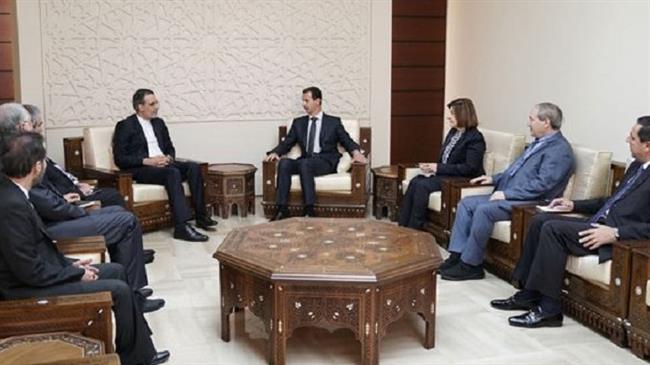Iran, Syria vow to keep anti-terror cooperation, counter US bids to spread chaos
Iran and Syria have pledged to keep counter-terrorism cooperation and to counter US bids to revive terrorists and create obstacles to prolong the war in the Arab country.
Tehran and Damascus discussed anti-terror cooperation during a meeting between Hossein Jaberi Ansari, senior assistant to the Iranian foreign minister on special political affairs, and Syrian President Bashar al-Assad in Damascus, Syria's official news agency SANA reported on Monday.
The meeting was also attended by Assad's political and media adviser, Bouthaina Shaaban, Syrian Deputy Foreign Minister Faisal al-Mikdad and the Iranian ambassador to Damascus.
Stressing the importance of Syrian-Iranian relations as a factor of stability, the two sides reaffirmed both nations’ determination to continue combating terrorist groups operating across the region.
They also underlined the need for a political settlement as the sole solution to the Syria crisis. They also vowed to resist any pressure by the United States, which is attempting after its failure to revive terrorists to topple the government in Damascus.
Iran has been offering military advisory support to Syria at the request of the Damascus government, enabling its army to speed up its gains on various fronts against terror outfits.
However, over the past few years, Israel, the closest ally of the US has frequently attacked military targets inside Syria in an attempt to prop up terrorist groups that have been suffering defeats in the battle against Syrian government forces.
In addition, the US-led coalition has been conducting airstrikes against what are said to be Daesh targets inside Syria since September 2014 without any authorization from the Damascus government or a UN mandate.
The military alliance has repeatedly been accused of targeting and killing civilians. It has also been largely incapable of achieving its declared goal of destroying Daesh.
The Syrian and Iranian sides also discussed a yet-to-be-formed constitutional committee, which is supposed to include representatives from various Syrian groups.
The committee is expected to include 150 members: 50 chosen by Damascus, 50 by the opposition and the final 50 by the UN outgoing envoy to Syria, Staffan de Mistura. It will also include civil society representatives, religious and tribal leaders, experts and women.
The UN-prepared list has already been rejected by Damascus, which is to draw up its own list, along with Russia, Iran and Turkey.
Even if the committee is finally established, analysts say the task of discussing a post-war constitution will be difficult.
The Syrian government has on numerous occasions said that it would only agree with some alteration to the current constitution, whereas the opposition is pushing for an entirely new constitution.
Separately, Jaberi Ansari also held a meeting with Syrian Foreign Minister Walid al-Muallem to discuss a range of issues on bilateral and regional developments.
Syria has been gripped by foreign-backed militancy since March 2011. The Syrian government says the Israeli regime and its Western and regional allies are aiding Takfiri terrorist groups wreaking havoc in the country.
Iran says it will maintain its advisory role in Syria and continue support for resistance groups as long as Damascus demands it.
VIDEO | Yemenis praise the military for its successful operations against Israel
VIDEO | Israel continues to bomb Gaza homes
VIDEO | An insider's view of the country: Meybod City in Yazd
‘All wars have rules. All of those rules have been broken’ by Israel
VIDEO | Report flags India’s violation of rights of Rohingya detainees
Turkey's foreign minister meets Syria's de facto leader in Damascus
VIDEO | US Syria plots
'Next to impossible' to rescue patients from Gaza's Kamal Adwan Hospital: Director













 This makes it easy to access the Press TV website
This makes it easy to access the Press TV website